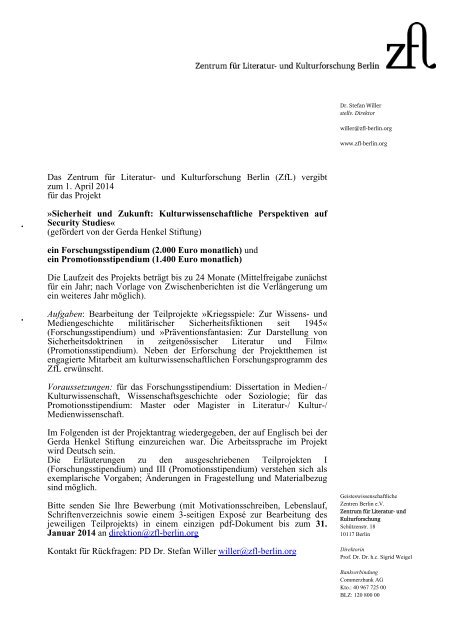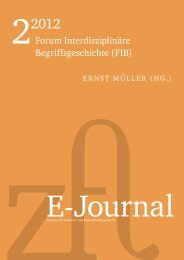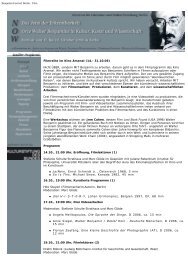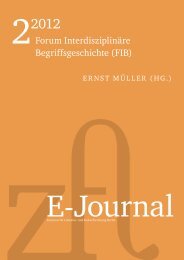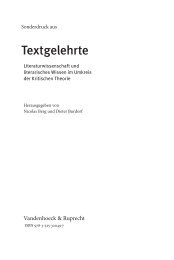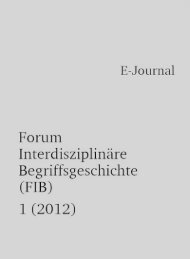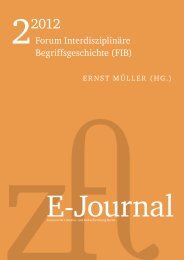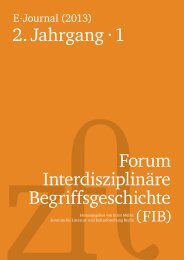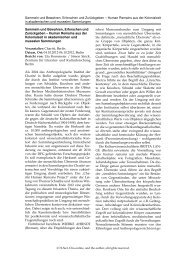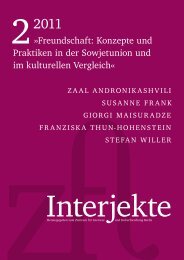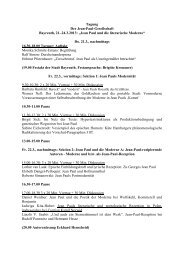Das Zentrum für Literatur- und Kulturforschung Berlin (ZfL) vergibt ...
Das Zentrum für Literatur- und Kulturforschung Berlin (ZfL) vergibt ...
Das Zentrum für Literatur- und Kulturforschung Berlin (ZfL) vergibt ...
Create successful ePaper yourself
Turn your PDF publications into a flip-book with our unique Google optimized e-Paper software.
Dr. Stefan Willer<br />
stellv. Direktor<br />
willer@zfl-berlin.org<br />
www.zfl-berlin.org<br />
<strong>Das</strong> <strong>Zentrum</strong> für <strong>Literatur</strong>- <strong>und</strong> <strong>Kulturforschung</strong> <strong>Berlin</strong> (<strong>ZfL</strong>) <strong>vergibt</strong><br />
zum 1. April 2014<br />
für das Projekt<br />
»Sicherheit <strong>und</strong> Zukunft: Kulturwissenschaftliche Perspektiven auf<br />
Security Studies«<br />
(gefördert von der Gerda Henkel Stiftung)<br />
ein Forschungsstipendium (2.000 Euro monatlich) <strong>und</strong><br />
ein Promotionsstipendium (1.400 Euro monatlich)<br />
Die Laufzeit des Projekts beträgt bis zu 24 Monate (Mittelfreigabe zunächst<br />
für ein Jahr; nach Vorlage von Zwischenberichten ist die Verlängerung um<br />
ein weiteres Jahr möglich).<br />
Aufgaben: Bearbeitung der Teilprojekte »Kriegsspiele: Zur Wissens- <strong>und</strong><br />
Mediengeschichte militärischer Sicherheitsfiktionen seit 1945«<br />
(Forschungsstipendium) <strong>und</strong> »Präventionsfantasien: Zur Darstellung von<br />
Sicherheitsdoktrinen in zeitgenössischer <strong>Literatur</strong> <strong>und</strong> Film«<br />
(Promotionsstipendium). Neben der Erforschung der Projektthemen ist<br />
engagierte Mitarbeit am kulturwissenschaftlichen Forschungsprogramm des<br />
<strong>ZfL</strong> erwünscht.<br />
Voraussetzungen: für das Forschungsstipendium: Dissertation in Medien-/<br />
Kulturwissenschaft, Wissenschaftsgeschichte oder Soziologie; für das<br />
Promotionsstipendium: Master oder Magister in <strong>Literatur</strong>-/ Kultur-/<br />
Medienwissenschaft.<br />
Im Folgenden ist der Projektantrag wiedergegeben, der auf Englisch bei der<br />
Gerda Henkel Stiftung einzureichen war. Die Arbeitssprache im Projekt<br />
wird Deutsch sein.<br />
Die Erläuterungen zu den ausgeschriebenen Teilprojekten I<br />
(Forschungsstipendium) <strong>und</strong> III (Promotionsstipendium) verstehen sich als<br />
exemplarische Vorgaben; Änderungen in Fragestellung <strong>und</strong> Materialbezug<br />
sind möglich.<br />
Bitte senden Sie Ihre Bewerbung (mit Motivationsschreiben, Lebenslauf,<br />
Schriftenverzeichnis sowie einem 3-seitigen Exposé zur Bearbeitung des<br />
jeweiligen Teilprojekts) in einem einzigen pdf-Dokument bis zum 31.<br />
Januar 2014 an direktion@zfl-berlin.org<br />
Kontakt für Rückfragen: PD Dr. Stefan Willer willer@zfl-berlin.org<br />
Geisteswissenschaftliche<br />
Zentren <strong>Berlin</strong> e.V.<br />
<strong>Zentrum</strong> für <strong>Literatur</strong>- <strong>und</strong><br />
<strong>Kulturforschung</strong><br />
Schützenstr. 18<br />
10117 <strong>Berlin</strong><br />
Direktorin<br />
Prof. Dr. Dr. h.c. Sigrid Weigel<br />
Bankverbindung<br />
Commerzbank AG<br />
Kto.: 40 967 725 00<br />
BLZ: 120 800 00
Gerda Henkel Fo<strong>und</strong>ation, Special Programme Security, Society, and the State<br />
Topic Focus 5: “Security Strategies between Doctrine Formation and Implementation”<br />
Security and the Future:<br />
A Cultural Studies Approach<br />
Applicants: PD Dr. Stefan Willer (Center for Literary and Cultural Research <strong>Berlin</strong>), PD Dr.<br />
Benjamin Bühler (Center for Literary and Cultural Research <strong>Berlin</strong> /University of Constance)<br />
1. Problem Statement and Research Interest<br />
Problem Statement<br />
The planned project investigates, from a cultural studies perspective, the connection between<br />
security and futurity. It analyzes the epistemic and cultural presuppositions of ‘security’ by<br />
focusing on I.) military scenarios since 1945, II.) debates on political ecology and risk prevention<br />
since 1970 and III.) representations of security and prevention in contemporary literature<br />
and film. By drawing on these cultural phenomena that have a broad impact on contemporary<br />
Western societies, the project aims to broaden both scientific research and public debate on<br />
security issues.<br />
Concepts as well as practices of security grow from their specific linkages to the future. Just<br />
like the term ‘security’ connotes strategy and planning, the very notion of security is prospective<br />
– prospective in a two-fold manner: For one, ‘security’ denotes our present-day management<br />
to reduce the potential of risk in the future, or to at least prolong the current, assessable<br />
situation into the future. At the same time, the term implies we possess assured knowledge of<br />
the future: It thus assumes a kind of presupposed certainty about the future. However, when it<br />
comes to debates of security within political, economical and technical domains, this presupposition<br />
of a certified knowledge about the future remains largely unheeded, as do its<br />
constitutive, legitimizing and organizing qualities. The role of climate research for the present<br />
debate on climate change can be <strong>und</strong>erstood as an example for this blind spot within current<br />
discussions of security issues: Politicians expect concrete statements from climate researchers<br />
concerning future changes of climate and suggestions as to what kind of preventive measures<br />
may be taken. Climate researchers, however, cannot meet these expectations, since they are<br />
only able to deliver prognoses of probability. The social significance of these prognoses lies<br />
precisely in the production and communication of uncertainty (Hulme 2009).<br />
Due to these often unrecognized, varying forms of assumptions about the future and the conflicts<br />
resulting from them, our project aims to investigate, from a cultural studies perspective,<br />
the connection between security and futurity. We will systematically examine the ambivalence<br />
tied to the concept of ‘security’: being secure and being sure. The project’s epistemological<br />
research trajectory thus aims at the issues and questions raised in topic focus 5, “Secu-<br />
2
ity Strategies between Doctrine Formation and Implementation.” We plan to address the gap<br />
between strategic principles and their implementation by focusing on a level below the originating<br />
of that gap, that is by revealing the epistemic and cultural presuppositions of these<br />
doctrines. In unveiling these shrouded presuppositions of the implementation process, and<br />
with a thorough analysis of their consequences, we hope to contribute to the debate on present-day<br />
security policy.<br />
Research Interest<br />
The charged bond between doctrines of security and what we consider as ‘knowledge’ of the<br />
future calls for a thorough analysis of the varied forms of this knowledge. The currently prevailing<br />
idea of prevention, for instance, links imaginations of the future with precautionary<br />
action. Utopian and dystopian fictions conceptualize futuristic forms of society, whether they<br />
might be totalitarian or anarchic. Narratives of progress suggest that both our individual security<br />
and security policies are constantly improving, all the while narratives of crisis suggest<br />
the exact opposite: it is the future decline of social organization that calls for higher security<br />
standards now. Thus strategies of security are gro<strong>und</strong>ed predominantly in prospective speech<br />
acts like promising or warning, and whether we create diagrams, tables or computer simulations<br />
– all scenarios of the future (or processes extending into the future) are significantly<br />
shaped by the particular media technology and narratives that are used to establish them. Present-day<br />
concepts of security are the result of a historical change of paradigm: From the premodern<br />
notion of an imperturbable world order established by God, to our modern, secularized<br />
form of society, which is marked by uncertainty but also by the possibility to shape and<br />
mold the future (Makropoulos 1997).<br />
In the following we will delineate the focal points of research that shape the project’s design<br />
into three subprojects.<br />
Institutionalization: In systematic and temporal terms, ‘security’ advances as the central category<br />
of governmental and non-governmental institutions. The collective civil transition in the<br />
late 19 th century towards an ‘insurance society’ demonstrates that no longer the state alone<br />
defines what is conceived <strong>und</strong>er the term security, but also life insurance companies and disciplines<br />
like statistics. Insurance policies, which function “as a form of assurance” aim to<br />
“discipline the future” by calculating risk (Ewald 1989, 387). In general, during the course of<br />
the 20 th century sciences like statistics and economy seem to evolve into specialist fields for<br />
anticipating the future, and their prognostications are deemed helpful by political authorities<br />
for their decision making. The military in particular emerges as an institutional guarantor for<br />
security, whether the army is declared, in the 21 st century, as a suitable tool for pursuing the<br />
vision of a peaceful and democratic Middle East – this is the notion with which then-U.S.<br />
president George W. Bush tried to legitimate the war in Iraq –, or whether the “security of the<br />
3
Federal Republic of Germany is being defended in the Hindu Kush too,” as the German former<br />
Minister of Defense Peter Struck declared. In this context, Subproject I will concentrate<br />
on military strategies of security and examine how scientific statements, disciplines and protagonists<br />
are incorporated in different security doctrines, and what kind of dynamics arise in<br />
the interstices of military, science and the state.<br />
Interpretative Dominance: The problematic choice of which security policy to follow is often<br />
aggravated when different protagonists display digressing ideas about security in general:<br />
Whether security is <strong>und</strong>erstood as a subjective feeling or as an objective condition, whether<br />
the security concern is of technical or political nature etc. – the term remains polyvalent. Thus<br />
on the one hand, security can be seen as a “catch-all term of modern times” adumbrating a<br />
utopian horizon of expectation (Münkler 2010, 22f.) while on the other hand, it can clearly<br />
navigate political agency in a certain direction. A current example in Germany of the latter<br />
case would be the nationally implemented transition towards alternative energy sources in the<br />
wake of the nuclear reactor disaster in Japan’s Fukushima. Here, a current incident in combination<br />
with potential future events led to a turnaro<strong>und</strong> of the political program of a party up<br />
till then supportive of nuclear energy. Several dimensions of meaning and divergent aspects<br />
of security concurred in this situation – technical and economical, social and ecological, personal<br />
and political – all to be integrated due to the prospective nature of the debate. The example<br />
illustrates how the ecological discourse plays a central role in the contemporary conception<br />
of security issues, from the debate on the radiating fallout after nuclear weapons testing<br />
to the debate of climate change. Subproject II will explore the mechanisms of motivation<br />
at play in developing security strategies against the backgro<strong>und</strong> of ecological issues, with a<br />
clear focus on how these mechanisms contribute to the conflict of interpretative dominance of<br />
the future.<br />
The Regime of Prevention: A special focus of attention will be placed on the degree of social<br />
effectiveness that the linkage between concepts of security and futurity has attained by now.<br />
Whenever human interventions are concerned, the aspect of effect must be considered an integral<br />
part of what we view as ‘knowledge’ about the future. The feedback of all the players<br />
involved in a system contributes to consistently changing that system, and thereby also to<br />
changing the assumed state of the future as it needs to be continually re-aligned. Generated by<br />
science and imparted through various media, our present-day assumptions about the future are<br />
implemented through such feedbacks. This does not only concern the ethical discourse on<br />
‘sustainability’ in economics, ecology and politics, it also applies to the cultural techniques of<br />
prophylaxis and prevention, ranging from medical to military strategies. With respect to the<br />
beginning of the 21 st century it may be justified to think of a veritable regime of prevention, a<br />
regime of preserving the status quo and maintaining the present. In contrast to the vigor of this<br />
situation the historical critique and cultural reflection of the idea of prevention is still in its<br />
4
infancy. Subproject III is directed to fill this gap and intends to provide a cultural-historical<br />
study that scrutinizes the cultural imaginations of prevention as sketched in literature and<br />
film.<br />
2. State of Research to Date<br />
Our project follows up on a number of diverse studies within the history of concepts (e.g.<br />
Hamilton 2013) and on sociological studies on the differentiation of concepts (Ewers/Nowotny<br />
1987; Luhmann 2003; Münkler/Bohlender 2010). In contrast and addition to<br />
what these studies offer, our project emphasizes the ambivalence and lack of definition adhering<br />
to the concept of ‘security.’ Our project argues that it is exactly this ambivalence, the<br />
metaphorical character of the term ‘security’ that shapes the discourse on security policy significantly.<br />
In terms of a theoretical discussion of security, François Ewald’s study L’état<br />
providence (1986) is central: Since, as Ewald has shown, social aspects are economized in<br />
today’s state forms, the state discharges its citizens into a life of self-care, leaving them to<br />
their own devices with respect to risk management (Bröckling 2008, 46; cf. Bröckling 2007).<br />
In his comedy Der Untergang der Titanic, Hans-Magnus Enzensberger claims that innovation<br />
is made possible only through the disaster that preceded it. Following this thrust, our project<br />
will take a closer look at studies that discuss the concept of security from an angle of accident<br />
and catastrophe, such as Ulrich Beck’s widely discussed book Risikogesellschaft. Auf dem<br />
Weg in eine andere Moderne (1986), Paul Virilio’s essay L’accident originel (2005), the volume<br />
Die Unordnung der Dinge. Eine Wissens- <strong>und</strong> Mediengeschichte des Unfalls (2009),<br />
edited by Christian Kassung, or the works by Eva Horn and Claus Pias on the epistemology of<br />
accident in the modern era, on worst case scenarios, and on military knowledge (Horn 2007,<br />
2010, 2011; Pias 2009, 2013). Further gro<strong>und</strong>work on the topics of effect assessment in technology<br />
and political consultancy has been published by Grunwald (2008, 2012).<br />
Our research on strategies of security will depart methodologically from these studies and<br />
steer along a new path by using the cultural studies methods of finding the historically hidden<br />
aspects of knowledge.<br />
3. Preliminary Studies by the Applicants<br />
Both applicants have been working since October 2010 in the project “Prognostics and <strong>Literatur</strong>e,”<br />
which will terminate in December 2013. We have analyzed historical situations of<br />
change from the early modern era to the present, examining the different ways of perspectivation<br />
of the future. Prognostics (literally meaning “pre-knowledge”) is <strong>und</strong>erstood here as a<br />
two-sided kind of knowledge: as knowledge about futurity (here ‘future’ takes on the role of<br />
an epistemic object) as well as knowledge in the future (here ‘future’ takes on the role as epistemic<br />
temporality, or epistemic mode, respectively). The results gathered in that project will<br />
5
e a vital base for the planned follow-up project, which will focus on the knowledge about the<br />
future implied in security discourses.<br />
The research results of the previous project will be published in an interdisciplinary edition,<br />
Glossar des Zukunftswissen (Munich: Fink, 2014 tbc.). In addition, both applicants are currently<br />
working on a joint literary monograph, Zukünfte der <strong>Literatur</strong> (<strong>Berlin</strong>: Kadmos, 2014<br />
tbc.). Further preliminary work includes several essays by both applicants (cf. bibliography).<br />
4. Objective, Methods, and Design of the Project<br />
The planned project will be headed by the applicants, who will also play an integral part in the<br />
actual work in progress on the basis of their preliminary studies (see paragraph 3) and as parts<br />
of their institution, the <strong>Berlin</strong> based Center for Literary and Cultural Research (Willer: Co-<br />
Director; Bühler: Heisenberg scholar). Stefan Willer will sign responsible for establishing the<br />
theoretical set-up of the project, as well as covering the research in the area of a history of<br />
concepts, tracing the historical semantics and imagery of the term security. He will act as<br />
main coordinator and be in charge of mentoring the dissertation thesis. Benjamin Bühler will<br />
continue to work on his Heisenberg project on Political Ecology, which in terms of topic,<br />
problem and method fits tightly into subproject II of this application.<br />
We are applying for material costs to conduct the project, and for the costs for personnel (stipends)<br />
for two of the three subprojects (Subproject I: postdoc; Subproject III: doctoral student).<br />
Subproject I: War Games. The History of Knowledge and Media in Military Fictions of Security<br />
since 1945<br />
Planning and strategy have always been an integral part of military action; however it is safe<br />
to assume that the expert protagonists involved in strategic planning have also always known<br />
reality to turn out a lot different from their plans. Carl von Clausewitz was the first to establish<br />
the formula of the “friction in war” in this respect. According to him, “the absolute, the<br />
mathematical as it is called, no where finds any sure basis in the calculations in the art of<br />
war.” From the outset there would be a play of possibilities, probabilities, good and bad luck,<br />
which “makes war of all branches of human activity the most like a game of cards.” (Clausewitz<br />
2009, 49 <strong>und</strong> 22). Clausewitz’ words refer to the conduct of war, yet they might just as<br />
well be applied to military strategies of security. These strategies need to anticipate future<br />
scenarios so that the army or state are rendered capable of acting. In order to be able to react<br />
to the enemy’s motions, his potential actions need to be anticipated, which is why all military<br />
‘knowledge’ of security is fictional in essence (see Horn 2007).<br />
This subproject shall investigate the backgro<strong>und</strong> for such fictions of security. It analyzes the<br />
strategies of argumentation and simulation, and questions the relation between military-<br />
6
strategic planning and political action. As its point of departure, the subproject will focus on<br />
the linkage between futurity research and war scenarios within the empiric futurity research<br />
post 1945, so-called ‘futurology.’ Herman Kahn, an expert for military strategies of the<br />
RAND Corporation at the time, sketched the consequences of a potential nuclear war in his<br />
1960 book On Thermonuclear War. We will scrutinize this key text of security studies to find<br />
out what kind of projection techniques – especially in a quantitative sense – have been used<br />
after World War II to gauge the effects and consequences of certain military actions.<br />
Against the backgro<strong>und</strong> of these historic scenarios stemming from the Cold War period, we<br />
will inquire in a second step into current military fictions of security. Specifically we will<br />
examine how new forms of enemies – networks, swarms, ‘sleepers’ – call for new techniques<br />
of modeling the future, for example research on the behavior of swarm systems (Horn/Gisi<br />
2009). Swarms are decentralized, self-organized collectives, whose potential conduct cannot<br />
be assessed in terms of simple causalities but may only be devised by computer simulations.<br />
Our subproject examines in how far our present-day simulations, scientifically advanced and<br />
technically complex as they are, still legitimate relatively ‘crude’ strategies of security. By<br />
this we mean for instance comprehensive monitoring systems like the U.S. American Echelon<br />
system, or biometric systems of identification. Since it is possible that the diffuse definition of<br />
security is the basic principle of such legitimations, we shall look into who the protagonists<br />
are that are involved in the transfer from science and technology to politics and thus contribute<br />
to the implementation of extensive strategies of security.<br />
The plan is to openly announce the postdoc stipend and fill it with a media scientist who also<br />
has competence in the history of knowledge. S/he will be asked to produce two studies (i.e.<br />
comprehensive essays), one on Herman Kahn and one about contemporary military fictions of<br />
security; if necessary, the suitable candidate may also draft a larger monographic study (e.g.<br />
habilitation thesis) on the topic.<br />
Subproject II: Scenarios of Catastrophe. On Political Ecology since 1970<br />
Since the 1970s, statements on ecological issues have become an integral part of social selfconceptualizations.<br />
‘Ecology’ in this sense is not to be <strong>und</strong>erstood as a sub-discipline of biology<br />
but rather as a ‘hybrid discipline’ (Enzensberger 1973) comprised of such different forms<br />
of knowledge as biology, chemistry and physics, but also ethical values, political views and a<br />
certain attitude towards life in general (Trepl 1987). The ecological discourse is especially apt<br />
for inspecting the mechanisms of doctrine formation and implementation because it cannot be<br />
linked to a certain social system (Luhmann 1986). In effect the discourse of political ecology<br />
works with all kinds of references to the future, which however always serve the legitimization<br />
and organization of political agency in the present, so that the sketching of future eco-<br />
7
logical disasters serves to legitimate present-day strategies of security, which are implemented<br />
solely for the purpose of preventing such a disastrous future from happening.<br />
We will look at documents from the 1970s depicting scenarios of disaster and check for their<br />
relation to the budding environmental movement of the time. Documents to be analyzed are<br />
the political essays by Carl Amery and Heinrich Gruhl, the public and scientific discussions<br />
aro<strong>und</strong> Denis Meadow’s study Limits to Growth, as well as manifestos like A Blueprint for<br />
Survival (1972). We will also include novels such as Amery’s Der Untergang der Stadt Passau<br />
(1975) or Ernest Callenbach’s Ecotopia (1975) and Ecotopia Emerging (1981). In a second<br />
step, we will focus on today’s debate on climate change and evaluate the strategies of<br />
security that might become vital if the effects of climatic change should become more drastic.<br />
As a theoretical bracket bringing these two research foci together we will contemplate the<br />
question as to where exactly the interpretative dominance lies these days; in other words, who<br />
has the power to determine what the future will look like? It is significant in this respect that<br />
at the moment scientific and fictional forms of representation seem to intersect in a wholly<br />
novel way. While Roland Emmerich’s movie 2012 (2009) creates scenarios of disaster in a<br />
spectacular fashion, Michael Crichton’s novel State of Fear (2004) claims climate change to<br />
be a fantasy created by eco activists – a claim which led to an official hearing at a committee<br />
of the U.S. American Senate. And while politicians hope to receive concrete instructions from<br />
climate researchers as to how to proceed, scientists in this field refuse to be politically exploited.<br />
This subproject is already well prepared and is f<strong>und</strong>ed as part of Benjamin Bühler’s Heisenberg<br />
stipend (see paragraph 3). We envisage publishing two studies (essays) on the topic as<br />
part of a planned monograph Regierungswissen. Politische Ökologie im 19. <strong>und</strong> 20. Jahrh<strong>und</strong>ert.<br />
Subproject III: Fantasies of Prevention. The Representation of Security Doctrines in Contemporary<br />
<strong>Literatur</strong>e and Film (Dissertation project)<br />
The notion of prevention may count as one of the most effective doctrines of security today.<br />
Prevention means to be prepared for the future in a way to outsmart it, that is, to make sure<br />
something does NOT happen in a certain way. This also means that the notion of prevention is<br />
characterized by a strange negativity: Future itself turns into the “causa finalis of its own prevention”<br />
(Fuchs 2008). The doctrine of prevention is seen as the standard for a responsible<br />
way of dealing with one’s life and that of the next generation. This applies similarly to precautionary<br />
actions by domestic and foreign affairs against potential terrorist attacks, but also<br />
on a ‘biopolitical’ level to the exploding number of medically prophylactic offers. Such complex<br />
(and slightly paradoxical) thinking in negative anticipations has turned into an extremely<br />
normative handling of futurity.<br />
8
Due to its social relevance, the concept of prevention has gathered distinct momentum in literature<br />
and film alike over the course of these past years. Subproject III focuses on these fictional<br />
representations of the concept. We will determine the basis for doctrines of prevention<br />
by studying current discussions in sociology (Bröckling 2008) and analyze the origins of the<br />
idea of prevention by looking at practices of insurance and precaution; by following its theorization<br />
within the sociological framework of risk; and by analyzing its current role in medical,<br />
military, and political debates. The main body of research will be a close reading of several<br />
examples of contemporary literary and filmic representations of prevention: How do<br />
these fictionalizations deal with the prospective structure of preventive thinking? How do they<br />
contemplate the notion’s current power and its potential consequences? Examples to be discussed<br />
are the fictitious pre-cognitive “Precrime” Office in Steven Spielberg’s movie Minority<br />
Report (2002), the dystopia of a medical-prophylactic dictatorship in Juli Zeh’s novel<br />
Corpus Delicti (2009) or the technological fantasies of surveillance and military pre-emption<br />
in Daniel Suarez’ novels Daemon (2006) and Kill Decision (2012).<br />
The dissertation project will argue that the novels and movies do not only incorporate the<br />
concept of prevention into their narrative structure, but represent narratologically what they<br />
transport on a topical level, thereby problematizing the very concept. The project reviews the<br />
narratological aspects of the discourse of prevention in detail: The advantage of knowledge on<br />
the side of the narrator, insinuation and overtones, directional conventions for reader guidance,<br />
techniques of narration as anticipation of the plot etc. Such a literary and mediatheoretical<br />
analysis can clarify the structure of preventive thinking.<br />
The doctoral stipend shall be openly announced and filled with a student of literature or media<br />
science.<br />
The goal of the overall research project is to offer a cultural-theoretical reflection of the problems<br />
attached to questions of state, security and society. We strive to explicate the theoretical<br />
preconditions of the multidimensional and ambivalent domain of security issues. By conjoining<br />
three exemplary research set-ups we aim to explore the linkage between doctrines of security<br />
and futurity. While the implementation of doctrines follows largely pragmatic reasoning<br />
(and has to do so), our project wants to unearth the hidden epistemic presuppositions that significantly<br />
shape these doctrines, yet are mostly overlooked. We target the conceptual gro<strong>und</strong>s<br />
and the suppressed mechanics of the implementation process, thereby helping to shed light on<br />
the often rogue systematic of security strategies. Thus if supported, our project will present a<br />
valuable input from a cultural studies angle to the controversial topic of security studies.<br />
Bibliography:<br />
Beck, Ulrich: Risikogesellschaft. Auf dem Weg in eine andere Moderne, Frankfurt/Main 1986.<br />
9
Bröckling, Ulrich: <strong>Das</strong> unternehmerische Selbst. Soziologie einer Subjektivierungsform,<br />
Frankfurt/Main 2007.<br />
Bröckling, Ulrich: “Vorbeugen ist besser… Zur Soziologie der Prävention,” in: Behemoth. A<br />
Journal on Civilisation 1 (2008), H. 1, pp. 38-48<br />
Bühler, Benjamin: “Zukunftsbezug <strong>und</strong> soziale Ordnung im Diskurs der politischen Ökologie,”<br />
in: Zeitschrift für Kulturwissenschaften 2 (2009), pp. 35-44.<br />
Bühler, Benjamin: “Repräsentationen der Ökologie,” in: ecozone@ 1 (2010), n. p.<br />
Bühler, Benjamin: “Entgleitende Regulierungen. Politische Ökologie im 20. Jahrh<strong>und</strong>ert,” in:<br />
Stefan Rieger, Manfred Schneider (Eds.), Selbstläufer / Leerläufer. Regelungen <strong>und</strong><br />
ihr Imaginäres im 20. Jahrh<strong>und</strong>ert, <strong>Berlin</strong>/Zurich 2012, pp. 177-197.<br />
Bühler, Benjamin: “Von ‘Hypothesen, die auf einer Hypothese gründen.’ Ökologische Prognostik<br />
in den 1970er Jahren,” in: Daniel Weidner, Stefan Willer (Eds.): Prophetie <strong>und</strong><br />
Prognostik Verfügungen über Zukunft in Wissenschaften, Religionen <strong>und</strong> Künsten,<br />
Munich 2013 (in print).<br />
Enzensberger, Hans Magnus: “Zur Kritik der politischen Ökologie”, in: Kursbuch 33 (1973),<br />
pp. 1-42.<br />
Evers, Adalbert/Nowotny, Helga: Über den Umgang mit Unsicherheit. Die Entdeckung der<br />
Gestaltbarkeit von Gesellschaft, Frankfurt/Main 1987.<br />
Ewald, François: L’état providence, Paris 1986.<br />
Fuchs, Peter: “Prävention – Zur Mythologie <strong>und</strong> Realität einer paradoxen Zuvorkommenheit,”<br />
in: Irmhild Saake/Werner Vogd (Eds.): Moderne Mythen der Medizin. Studien zur organisierten<br />
Krankenbehandlung, Wiesbaden 2008, pp. 363-378.<br />
Grunwald, Armin: Technik <strong>und</strong> Politikberatung. Philosophische Perspektiven, Frankfurt/Main<br />
2008.<br />
Grunwald, Armin: Technikzukünfte als Medium von Zukunftsdebatten <strong>und</strong> Technikgestaltung,<br />
Karlsruhe 2012.<br />
Hamilton, John T.: Security: Politics, Humanity, and the Philology of Care, Princeton 2013.<br />
Horn, Eva/Gisi, Lucas (Eds.): Schwärme – Kollektive ohne <strong>Zentrum</strong>. Eine Wissensgeschichte<br />
zwischen Leben <strong>und</strong> Information, Bielefeld 2009.<br />
Horn, Eva: Der geheime Krieg. Verrat, Spionage <strong>und</strong> moderne Fiktion, Frankfurt/Main 2007.<br />
Horn, Eva: “Enden des Menschen. Globale Katastrophen als biopolitische Fantasie,” in: Reto<br />
Sorg and Stefan B. Würffel (Eds.): Utopie <strong>und</strong> Apokalypse in der Moderne, Munich<br />
2010, pp. 101–118.<br />
Horn, Eva: “Die Zukunft der Dinge. Über Unfälle <strong>und</strong> Sicherheit,” in: Behemoth. A Journal<br />
on Civilization, 2011, n. p., online: www.behemoth-journal.de<br />
Hulme, Mike: Why we disagree about climate change. Understanding controversy, inaction<br />
and opportunity, Cambridge 2009.<br />
Luhmann, Niklas: Soziologie des Risikos, <strong>Berlin</strong> 2003.<br />
Luhmann, Niklas, Ökologische Kommunikation. Kann die moderne Gesellschaft sich auf ökologische<br />
Gefährdungen einstellen? Wiesbaden 1986.<br />
Makropoulos, Michael: Modernität <strong>und</strong> Kontingenz, Munich 1997.<br />
Münkler, Herfried: “Strategien der Sicherung: Welten der Sicherheit <strong>und</strong> Kulturen des Risikos.<br />
Theoretische Perspektiven,” in: Herfried Münkler/Matthias Bohlender/Sabine<br />
Meurer (Eds.): Sicherheit <strong>und</strong> Risiko. Über den Umgang mit Gefahr im 21. Jahrh<strong>und</strong>ert,<br />
Bielefeld 2010, pp. 11-34.<br />
Pias, Claus (Ed.): Abwehr. Modelle Strategien Medien, Bielefeld 2009.<br />
Pias, Claus (Ed.): Herman Kahn. Szenarien für den Kalten Krieg, <strong>Berlin</strong>/Zurich 2013 (in<br />
print).<br />
Trepl, Ludwig, Geschichte der Ökologie. Vom 17. Jahrh<strong>und</strong>ert bis zur Gegenwart. Zehn Vorlesungen,<br />
Frankfurt/Main 1987.<br />
Virilio, Paul: L’accident originel, Paris 2005.<br />
10
Willer, Stefan: Prophetie <strong>und</strong> Prognostik. Verfügungen über Zukunft in Wissenschaften, Religionen<br />
<strong>und</strong> Künsten, Munich 2013 (ed. with Daniel Weidner, in print).<br />
Willer, Stefan: “Prognose,” in: Historisches Wörterbuch der Rhetorik, ed. Gert Ueding, vol.<br />
10: Ergänzungen A–Z, Register, Tübingen 2011, col. 958-966.<br />
Willer, Stefan: “Vom Nicht-Wissen der Zukunft. Prognostik <strong>und</strong> <strong>Literatur</strong> um 1800 <strong>und</strong> um<br />
1900,” in: Michael Bies, Michael Gamper (Eds.): <strong>Literatur</strong> <strong>und</strong> Nicht-Wissen. Historische<br />
Konstellationen in <strong>Literatur</strong> <strong>und</strong> Wissenschaft, 1750–1930, Zurich 2012, pp.<br />
171-196.<br />
Willer, Stefan: “Zwischen Futur Eins <strong>und</strong> Futur Zwei. Georg Kleins Grammatik der Zukunft,”<br />
in: Christoph Jürgensen, Tom Kindt (Eds.): “Wie in luzidem Schlaf.” Zum Werk<br />
Georg Kleins, <strong>Berlin</strong> 2013, pp. 131-141.<br />
Willer, Stefan: “Dietmar Daths enzyklopädische Science Fiction,” in: Stefan Willer (Ed.):<br />
Roman als Enzyklopädie, special issue of arcadia (2013, in preparation).<br />
11


